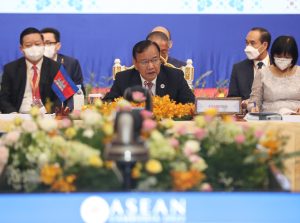Cambodia, as the chair of the Association of Southeast Asian Nations (ASEAN) in 2022, was forced to address a host of challenges, including the COVID-19 pandemic, economic troubles, the Taiwan Strait crisis, the ongoing war between Russia and Ukraine, and the civil war in Myanmar. Among the aforementioned issues, Myanmar’s domestic crisis was the challenge that most directly affected the Southeast Asian regional bloc. During its year as ASEAN chair, Cambodia put a lot of effort into resolving the crisis, and Cambodia’s top diplomats made a number of visits to the country. Despite the fact that there was little progress in the implementation on ASEAN’s Five-Point Consensus peace plan, there are some lessons that Indonesia, ASEAN’s current chair, can learn from Cambodia.
The first lesson is that Indonesia should not pressure Myanmar or isolate it from ASEAN, and should instead work with the military junta in a flexible and informal manner. This engagement is not aimed at legitimizing or accommodating the military junta, but at navigating possible ways to rebuild trust and confidence with the military in pursuit of the effective implementation of the Five-Point Consensus, which calls for an immediate end to the violence in the country and inclusive political dialogue involving “all parties” to the conflict.
Shortly after Cambodia took over the chairmanship of ASEAN, high-ranking Cambodian government officials, including Prime Minister Hun Sen, visited Myanmar – a sign of Phnom Penh’s willingness to push forward the ASEAN peace plan. The Cambodian government hailed Senior Gen. Min Aung Hlaing’s pledge to extend a national ceasefire until the end of 2022 and his welcoming of the ASEAN envoy to Myanmar. However, Cambodia did not shy away from condemning the regime. In July, it strongly condemned the military government for carrying out the execution of the five pro-democracy activists and accused the junta of a gross lack of will to implement the Consensus.
As ASEAN chair, Indonesia needs to work flexibly with the military-led government of Myanmar. Unnecessary pressure and isolation of the military regime will only worsen the situation and lead to further serious human rights violations. Despite Cambodia being unable to attain a political solution to Myanmar’s critics, Cambodia’s voice was heard and considered by the military junta. An indication of this was the Myanmar military junta’s decision to release 5,774 prisoners, 712 of which were political prisoners, including Sean Turnell, a former advisor to Aung San Suu Kyi, and former British ambassador Vicky Bowman. It is important for Indonesia to continue this engagement with the Myanmar military, in order to keep open the channels of communication, so that it remains possible for the ASEAN chair to have voice on Myanmar.
The second lesson that Indonesia can learn from Cambodia is that ASEAN’s special envoy should not focus solely on ending the civil war. It is true that ASEAN’s ultimate goal is to end the conflict in Myanmar, but it shows few signs of ending any time soon. A main reason for this is that neither side has agreed to compromise and both have sufficient resources to sustain their struggle. The civil war will not end until both sides are exhausted and willing to talk. Against this background, protecting civilians and maintaining humanitarian aid should be at the top of Indonesia’s agenda.
This is something that Cambodia sought to achieve during its time as chair. Last May, Cambodia organized a Consultative Meeting to discuss the ASEAN Humanitarian Response Framework. The purpose of the meeting was to address the operational challenges facing the delivery of humanitarian assistance and pave the way for ASEAN to provide humanitarian assistance to all parties to the conflict. Providing assistance to Myanmar is clearly of the utmost importance. According to UNICEF, around 17.6 million people, who make up almost a third of Myanmar’s population, are in urgent need of humanitarian assistance.
Finally, while Indonesia seeks to push the Myanmar military junta to implement the Five-Point Consensus, it should also lobby external actors, notably China and Russia, to pressure Myanmar to adopt the ASEAN peace plan. The two countries play an essential role in the survival of the military junta, providing the regime with economic and military aid that allows it to continue its atrocities against civilians and also to wage war against the other armed ethnic groups. For example, Chinese Foreign Minister Wang Yi paid a visit to Myanmar in April 2022 and pledged support for the military administration, and also strengthened economic ties with the junta through the China-Myanmar Economic Corridor, a pillar of the Belt and Road Initiative.
Russia also supported the regime. Min Aung Hlaing paid two official visits to Russia in 2022, while Russia continued to provide armed support to the military regime. There have been reports of the Myanmar military government using Russian-made Yak-130 aircraft in attacks on populated civilian areas.
The support of these two powerful countries has allowed the military regime to neglect the Five-Point Consensus. Against this backdrop, Indonesia should urge the two superpowers to follow the ASEAN framework to facilitate peace in Myanmar, particularly by ceasing to provide legitimacy, and financial and military support, to the junta. Indonesia, as an influential country in ASEAN that enjoys good relations with both China and Russia, could have some influence on their policy orientation. But as long as the two countries continue to support the regime, peace in Myanmar will be elusive.

































